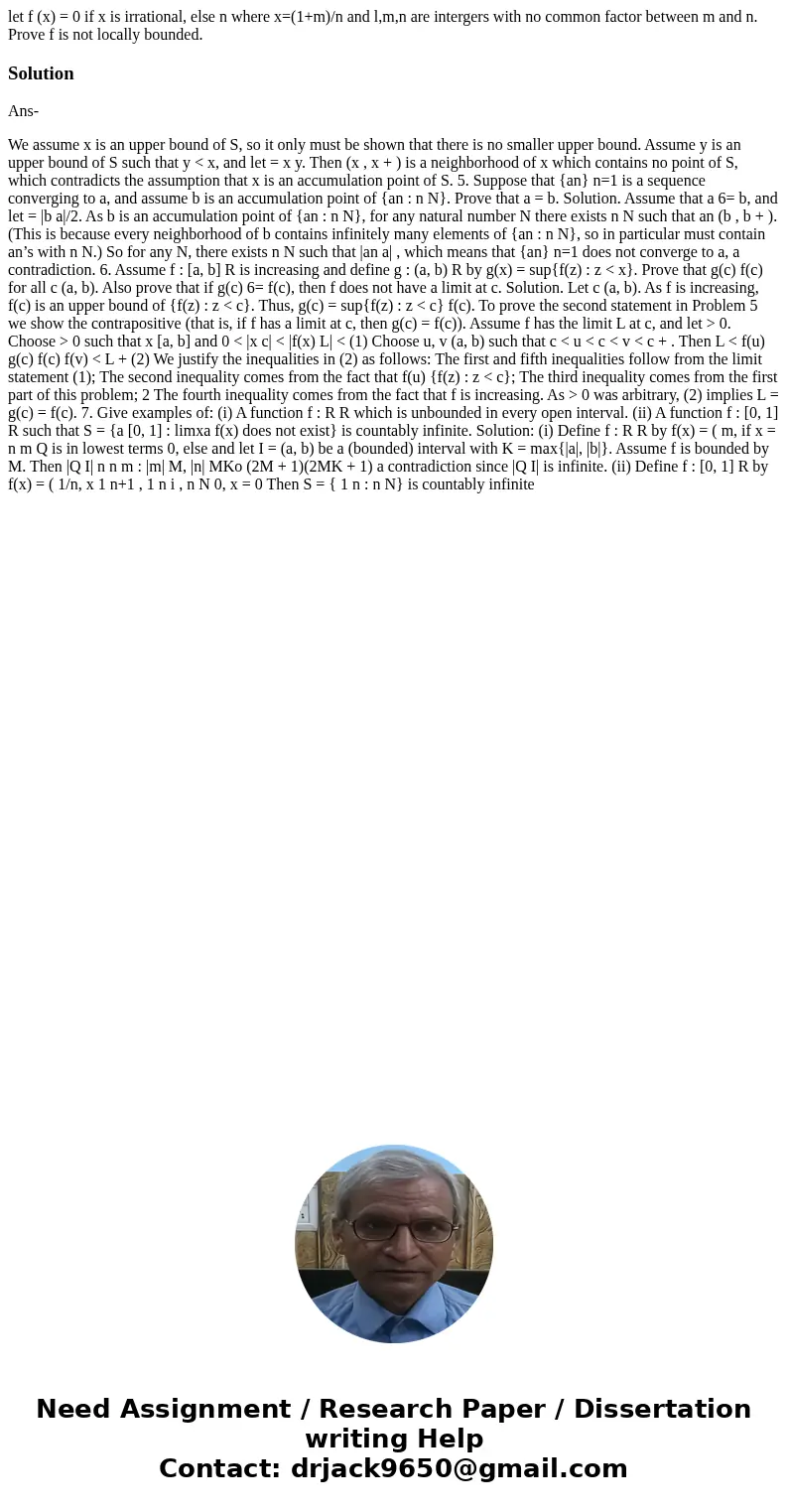let f x 0 if x is irrational else n where x1mn and lmn are
let f (x) = 0 if x is irrational, else n where x=(1+m)/n and l,m,n are intergers with no common factor between m and n. Prove f is not locally bounded.
Solution
Ans-
We assume x is an upper bound of S, so it only must be shown that there is no smaller upper bound. Assume y is an upper bound of S such that y < x, and let = x y. Then (x , x + ) is a neighborhood of x which contains no point of S, which contradicts the assumption that x is an accumulation point of S. 5. Suppose that {an} n=1 is a sequence converging to a, and assume b is an accumulation point of {an : n N}. Prove that a = b. Solution. Assume that a 6= b, and let = |b a|/2. As b is an accumulation point of {an : n N}, for any natural number N there exists n N such that an (b , b + ). (This is because every neighborhood of b contains infinitely many elements of {an : n N}, so in particular must contain an’s with n N.) So for any N, there exists n N such that |an a| , which means that {an} n=1 does not converge to a, a contradiction. 6. Assume f : [a, b] R is increasing and define g : (a, b) R by g(x) = sup{f(z) : z < x}. Prove that g(c) f(c) for all c (a, b). Also prove that if g(c) 6= f(c), then f does not have a limit at c. Solution. Let c (a, b). As f is increasing, f(c) is an upper bound of {f(z) : z < c}. Thus, g(c) = sup{f(z) : z < c} f(c). To prove the second statement in Problem 5 we show the contrapositive (that is, if f has a limit at c, then g(c) = f(c)). Assume f has the limit L at c, and let > 0. Choose > 0 such that x [a, b] and 0 < |x c| < |f(x) L| < (1) Choose u, v (a, b) such that c < u < c < v < c + . Then L < f(u) g(c) f(c) f(v) < L + (2) We justify the inequalities in (2) as follows: The first and fifth inequalities follow from the limit statement (1); The second inequality comes from the fact that f(u) {f(z) : z < c}; The third inequality comes from the first part of this problem; 2 The fourth inequality comes from the fact that f is increasing. As > 0 was arbitrary, (2) implies L = g(c) = f(c). 7. Give examples of: (i) A function f : R R which is unbounded in every open interval. (ii) A function f : [0, 1] R such that S = {a [0, 1] : limxa f(x) does not exist} is countably infinite. Solution: (i) Define f : R R by f(x) = ( m, if x = n m Q is in lowest terms 0, else and let I = (a, b) be a (bounded) interval with K = max{|a|, |b|}. Assume f is bounded by M. Then |Q I| n n m : |m| M, |n| MKo (2M + 1)(2MK + 1) a contradiction since |Q I| is infinite. (ii) Define f : [0, 1] R by f(x) = ( 1/n, x 1 n+1 , 1 n i , n N 0, x = 0 Then S = { 1 n : n N} is countably infinite

 Homework Sourse
Homework Sourse